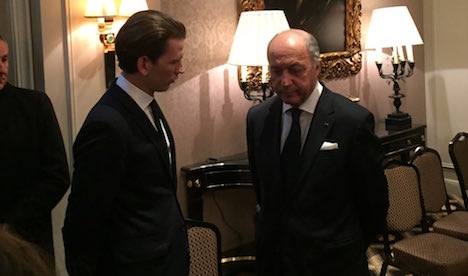Some 20 delegations gathered for a second round of talks on Syria's nearly five-year conflict that has left 250,000 dead, sparked a refugee crisis in Europe and birthed the Islamic State group that has terrorised many nations at the table.
World diplomats seeking an end to Syria's war will meet again in “approximately one month” to review progress towards a ceasefire and the start of a political process, said an official statement Saturday.
There is still no agreement on the future of President Bashar al-Assad despite concrete progress in talks on ending the Syrian civil war, US Secretary of State John Kerry said Saturday.
“We still still differ on what happens to Bashar al-Assad,” Kerry told a joint news conference with Russian Foreign Minister Sergei Lavrov and UN special envoy Staffan de Mistura after talks in Vienna.
The 17 countries, European Union, United States and Arab League meeting in Vienna agreed on a set calendar for a transition government in Syria within six months and elections in 18 months, however the tricky subject of the fate of Syrian President Bashar al-Assad remained undecided.
Paris became the latest victim of the snowball effect of Syria's conflict with a series of attacks Friday night that left almost 130 people dead at the hands of gunmen who blamed their actions on French military action in Syria.
Vowing France would not stop its “international action”, Foreign Minister Laurent Fabius said in Vienna that the killings underlined the need to “increase the international coordination in the struggle against Daesh (ISIS).”
He said France had ordered security stepped up at embassies and official buildings around the world as he rushed back to his traumatised country after only a few hours in Vienna.
Russian Foreign Minister Sergei Lavrov agreed, saying that the attacks were “no justification” to ease up on tackling radical jihadists such as ISIS and the Al-Nusra Front, affiliated to Al-Qaeda.
And US Secretary of State John Kerry said that the attacks will “stiffen our resolve, all of us, to fight back.”
“If they've done anything they've encouraged us today to do even harder work to make progress and to help resolve the crises that we face,” he said.
EU foreign policy chief Federica Mogherini said that the bloodbath added “another kind of meaning” to the gathering.
“The countries sitting around the table have almost all experienced the same pain, the same terror,” she said, citing the recent Russian plane disaster in Egypt and suicide bombings in Beirut and Turkey.
Assad's role
In almost five years, fighting between the regime of Syrian President Bashar al-Assad and rebel groups as well as ISIS militants has killed over 250,000 people and forced millions into exile, leaving many of them stranded in neighbouring states.
Others have headed to Europe, causing major splits in the European Union over how to stem the flow and share out the new arrivals among the bloc.
The Paris attacks threw into stark relief the need to resolve the Syrian conflict, but also how complex a task that is.
Among those in Vienna are regional rivals Saudi Arabia and Iran as well as Russia, and western nations, and they have seemingly insurmountable differences on how to reach a solution.
At the last Syria talks on October 30, the participants urged the UN to broker a peace deal between the regime and opposition to clear the way for a new constitution and elections.
Building on that, this round of talks will try to agree on a roadmap for peace that would include a ceasefire between Assad's forces and some opposition groups, diplomats say.
But a key issue — which was absent from the last meeting's declaration — remains Assad's future.
Western and Arab countries want him out of the way in order to allow a transitional government to unite the country behind a reconciliation process and to defeat ISIS.
British Foreign Secretary Philip Hammond said on Friday that Assad “has to go”.
He added, however, that Western powers “recognise that if there will be a transition he may play a part, up to a point, in that transition”.
But Russia, carrying out air strikes against Syrian rebels since late September, is sticking by Assad along with Shiite Iran, which does not want a Sunni-controlled Syria.
“Syria is a sovereign country, Bashar al-Assad is a president elected by the people,” said Russian President Vladimir Putin.
'Walls of mistrust'
Putting that aside, the talks will focus on deciding which of the Syrian government, rebel and opposition factions — none of whom will be represented at the talks — will shape the country's future.
But deciding which of the many opposition groups are moderate enough to be acceptable and which to sideline as “terrorists” is likely to be no easy task.
“I cannot say… that we are on the threshold of a comprehensive agreement, no,” Kerry had said on Thursday.
“The walls of mistrust within Syria, within the region, within the international community are thick and they are high.”


 Please whitelist us to continue reading.
Please whitelist us to continue reading.